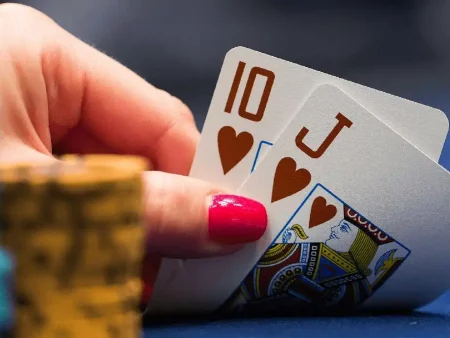The popular term “backdoor” refers to a situation where a player has a hand that is partially formed, with the possibility of completing it only after receiving the necessary cards on the turn and river. Some inexperienced players may consider such a hand less promising, while others may overestimate it, continuing to chase it without realistic chances of winning or a clear plan at that stage of the hand. The truth, as often is the case, lies somewhere in the middle: while the potential of backdoor hands should be considered, to effectively use this strategic element in online casinos, it’s essential to fully understand its nature.
Thus, the term “backdoor” in poker comes from the English word “backdoor,” which literally means “secret entrance.” In this context, it metaphorically suggests that a player’s hand on the flop looks like a losing hand, but there’s a chance to “sneak through the backdoor” and win the pot. To do this, a card that completes a four-card hand must appear on the turn, and the hand must be completed on the river. Here are a few illustrative examples.
Backdoor to the Straight
Denis has cards of different suits. On the flop, Denis doesn’t yet have a completed hand, not even a pair. The best hand he could make is a straight. This is possible if a seven comes on the turn and a ten on the river. To calculate the probability of completing this hand, the odds of each required card on each stage are multiplied. On the turn, there are 8 outs: 4 tens and 4 sevens. This means the probability is 8/47 = 17%. On the river, there are 4 outs remaining: 4/46 = 8.7%. The overall probability of successfully completing the hand is 0.17 * 0.087 = 0.0136, or 1.36%. In poker jargon, this backdoor draw is also called “runner-runner.”
Team Play in Poker: What Is It and Why Is Fairness Important?
Team play in poker, also known as “collusion,” is a strategy where multiple players agree on actions in advance or conspire during the game. This undermines the principles of fair competition, creating an imbalance and giving unfair advantages to the participants involved.
Why is it a problem? Players engaging in such tactics may synchronize their actions or share information about their cards. This allows them to manipulate the outcome of the game and, ultimately, profit more. Online poker platforms are well aware of the importance of fairness and take measures to detect and prevent such violations.
Read also: The ABI indicator in poker.
Fair Play Rules: The Foundation of a Balanced Environment
Every player is expected to follow the rules of fair play. This not only helps maintain order within the poker community but also protects the reputation of online casinos. If violations are detected, players may face severe penalties, including account suspension.
Why take risks when there are honest ways to improve your game? For example, you can use bonuses offered by reputable platforms. This is a safe and legitimate way to increase your chances of success.
What Is Team Play?
Team play, or collusion, has several distinct characteristics:
- Pre-arranged agreements. Participants discuss strategies in advance: which cards to play, how to bet, and what actions to take in specific situations.
- Coordination during the game. Players exchange information, helping each other make more accurate decisions.
- Maximizing profits. The primary goal of the team is to extract maximum benefits and minimize losses, even through dishonest methods.
It’s essential to remember that such tactics violate the rules of fair play. Collusion can lead to disciplinary action and serious consequences, including loss of access to the platform.
Pros and Cons of Team Play
Like any strategy, collusion has its advantages and disadvantages.
Advantages:
- The potential to earn more through coordinated actions.
- Emotional support from teammates, which can positively influence decision-making.
Disadvantages:
- Violation of fair play rules.
- Risk of losing trust among other players.
- Damage to reputation within the poker community.
Despite the short-term benefits, team play causes significant harm to the poker ecosystem, making it less fair and transparent.
Read also: Suits in poker: hierarchy and importance in the game.
How to Spot Team Play?
To protect yourself from fraud, pay attention to the following signs:
- Unusual coordination. If several players repeat similar actions or play exceptionally aggressively, it could be a sign of collusion.
- Recurring group compositions. Regular appearances of the same players at the same table should raise suspicion.
- Intuition. If something feels off, trust your instincts and investigate further.
- Reporting to administration. If suspicions are confirmed, contact the poker room’s support team for an official investigation.
Solo “Team Play”: How Does a Lone Cheater Operate?
Sometimes fraud is carried out solo. This is known as “Single Timing.” How it works:
- A player creates multiple accounts and plays under them simultaneously.
- Different IP addresses or virtual machines are used for disguise.
- Intentional losses may be employed to divert suspicion.
This is a highly organized yet entirely dishonest strategy. Poker platforms actively combat such methods.
The Importance of Fairness in Poker
Fairness is the cornerstone of the poker community. Adhering to the rules helps preserve the spirit of the game and ensures equal opportunities for all participants. Understanding the principles of fair play and learning how to avoid fraud not only makes your game safer but also more enjoyable. Are you a fan of live casinos? Then you’ll love live casino and poker articles – pros and cons, plus strategies!
FAQ: Timing in poker – how to detect and avoid becoming a victim of cheating
What is timing in poker?
Timing in poker refers to the duration a player takes to make decisions during a hand, such as calling, raising, or folding.
Skilled players often use timing to gather information about their opponents’ strength or intentions.
How can timing be used to detect cheating in poker?
Unusual or consistent timing patterns, especially in online poker, may indicate potential collusion or use of software assistance.
For example, players who always take the same amount of time to act might be using automated tools.
What are common cheating techniques involving timing in poker?
- Collusion: Two or more players share information and adjust their actions to manipulate the game.
- Bots: Automated programs that play hands with inhumanly consistent timing.
- Time-based signals: Players using specific delays to communicate information during a game.
What are the warning signs of timing-based cheating?
- Players with overly consistent or mechanical decision-making times.
- Unusual pauses or delays during critical moments of a hand.
- Coordinated behavior among opponents that seems unnatural.
How can players protect themselves from timing-based cheating?
- Stay alert: Watch for repetitive timing patterns or suspicious behavior.
- Choose reputable platforms: Play on well-regulated poker sites with strong anti-cheating measures.
- Report concerns: Notify the platform if you suspect unfair play or cheating.
Is timing manipulation common in live poker?
Timing manipulation is less common in live poker due to the physical presence of players and direct observation.
However, players may still use subtle timing strategies, such as taking longer to act with weak hands to mislead opponents.
Can timing tells be used as part of a legitimate strategy?
Yes, timing tells can provide valuable information about an opponent's hand strength.
For instance, a quick call might indicate a weak or marginal hand, while a deliberate pause could suggest a difficult decision or a strong hand.
What should players do if they suspect cheating?
- Document the situation: Take notes on suspicious timing patterns or behaviors.
- Contact support: Reach out to the platform’s customer service or tournament officials.
- Stay calm: Avoid making accusations at the table without concrete evidence.
How do online poker platforms combat timing-based cheating?
Reputable poker platforms use advanced algorithms to detect suspicious patterns and enforce strict anti-cheating policies.
They may also use player reports and independent investigations to maintain game integrity.






